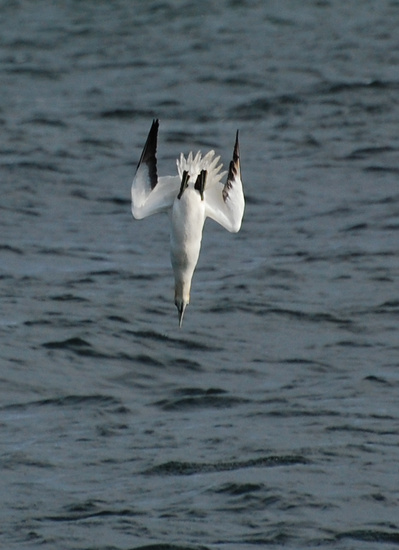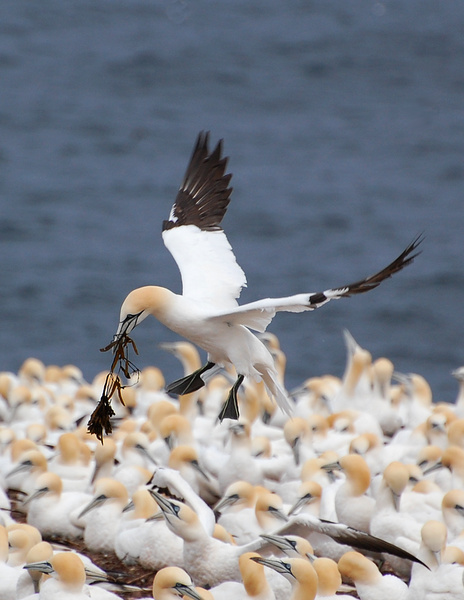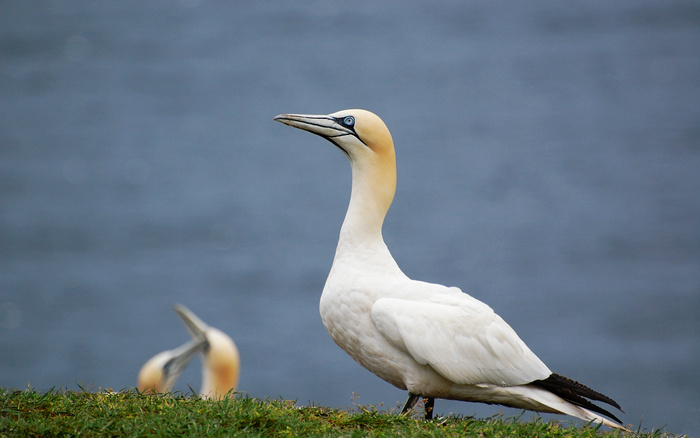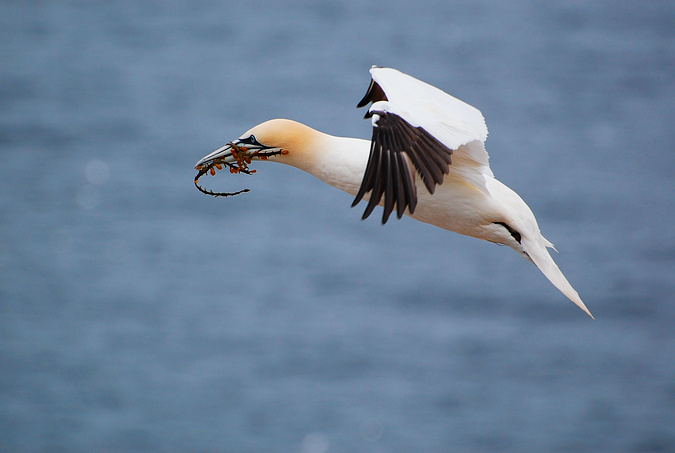
Bonaventure Island Gannet Colony
July 6th, 2009
They were as awesome as I expected.
My first introduction to them was from the pier. They come close to land most days to dive for small fish. Some evenings there were downright spectacular feeding frenzies. I've seen plenty of diving birds in my time, but nothing like this. They fold into a dart shape just before they hit the water, and go in like rockets. The momentum can take them as far as 22 meters under.

1680x1050 wallpaper
That was exciting, but the pièce de résistance was actually visiting the colony. Tens of thousands of nesting pairs. From the boat, they dot the cliffs as far as your eye can see. From land (after a brief hike) you can see the considerable number of them who actually nest on top of the cliff, and you get a close-up view of courtship and nesting behaviors. Many were already brooding eggs, a few even had newborns. Males continually flew in with hunks of seaweed to line the nests. Others walked to the periphery of the colony to gather sod for the same purpose.

(I think my husband took that one.)
Gannet pairs court and maintain pair bonds by "beak fencing." This is a little different from what the tourist copy might lead you to expect. What you'll read is something like this: "The gannets majestically point skyward and engage in a gentle ritual of tapping beaks." What it actually looks like is more this: one bird points at the sky and starts wagging its head back and forth. The other then does the same thing, and the wagging causes their beaks to tap. Occasionally, one of them will get distracted and start fiddling with something on the ground. The mate continues to wag back and forth by itself, and then the distracted gannet is like, "oh yeah. Right: kissy kissy" and gets back with the program.
They mate for life. Mothers and fathers are both heavily involved in the rearing of young. Both brood, feed and protect their offspring. Males build the nests.
Territorial tiffs were common. Anytime a gannet landed not quite within the invisible boundaries of its (tiny) nesting territory, the gannets in the adjacent nest snapped at it with their beaks.
Around the edges of the colony were the juveniles--young of the last few years--who would not be breeding yet. Instead, they stood alone practicing their skypointing and head-wagging, and probably learning from what they saw in the older birds.
The photographic challenge was, for a change, not finding the bird, nor getting it to come close enough. Those were both easy. The hard part was getting a picture of something other than an undifferentiated mass of gannets. So I sought the stragglers, the oddballs, the ones just flying into and out of the colony or wandering on the periphery.
I have way too many of these to stick into one post. For now, I'll just share two more: the two I'm proudest of.

1920x1080 wallpaper

1920x1080 wallpaper
July 6th, 2009
They were as awesome as I expected.
My first introduction to them was from the pier. They come close to land most days to dive for small fish. Some evenings there were downright spectacular feeding frenzies. I've seen plenty of diving birds in my time, but nothing like this. They fold into a dart shape just before they hit the water, and go in like rockets. The momentum can take them as far as 22 meters under.

1680x1050 wallpaper
That was exciting, but the pièce de résistance was actually visiting the colony. Tens of thousands of nesting pairs. From the boat, they dot the cliffs as far as your eye can see. From land (after a brief hike) you can see the considerable number of them who actually nest on top of the cliff, and you get a close-up view of courtship and nesting behaviors. Many were already brooding eggs, a few even had newborns. Males continually flew in with hunks of seaweed to line the nests. Others walked to the periphery of the colony to gather sod for the same purpose.

(I think my husband took that one.)
Gannet pairs court and maintain pair bonds by "beak fencing." This is a little different from what the tourist copy might lead you to expect. What you'll read is something like this: "The gannets majestically point skyward and engage in a gentle ritual of tapping beaks." What it actually looks like is more this: one bird points at the sky and starts wagging its head back and forth. The other then does the same thing, and the wagging causes their beaks to tap. Occasionally, one of them will get distracted and start fiddling with something on the ground. The mate continues to wag back and forth by itself, and then the distracted gannet is like, "oh yeah. Right: kissy kissy" and gets back with the program.
They mate for life. Mothers and fathers are both heavily involved in the rearing of young. Both brood, feed and protect their offspring. Males build the nests.
Territorial tiffs were common. Anytime a gannet landed not quite within the invisible boundaries of its (tiny) nesting territory, the gannets in the adjacent nest snapped at it with their beaks.
Around the edges of the colony were the juveniles--young of the last few years--who would not be breeding yet. Instead, they stood alone practicing their skypointing and head-wagging, and probably learning from what they saw in the older birds.
The photographic challenge was, for a change, not finding the bird, nor getting it to come close enough. Those were both easy. The hard part was getting a picture of something other than an undifferentiated mass of gannets. So I sought the stragglers, the oddballs, the ones just flying into and out of the colony or wandering on the periphery.
I have way too many of these to stick into one post. For now, I'll just share two more: the two I'm proudest of.

1920x1080 wallpaper

1920x1080 wallpaper
| ← | → |
